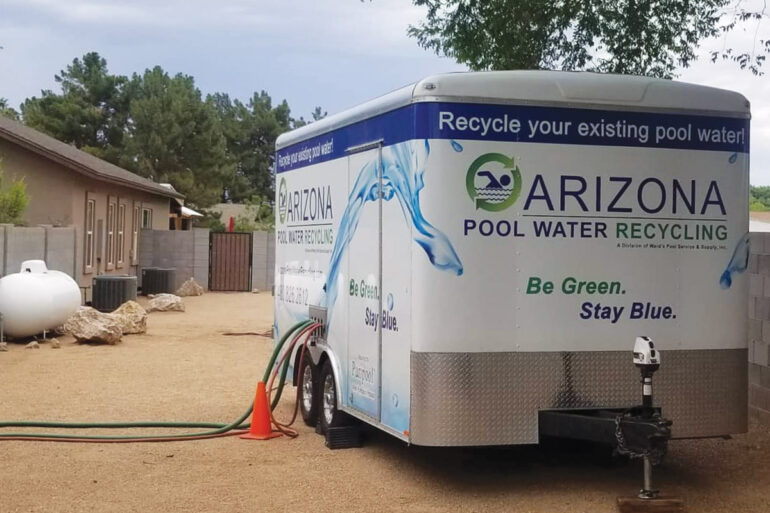Money in Hand

You’ve done the job;
the customer is delighted — they say,
“Send me the bill.”
You do.
You wait for payment…
you send a second reminder —
and still await payment.
Then a third notice is mailed…
and a fourth.
Phone calls to the customer
are not returned.
Collection letters are sent certified, return receipt.
Each comes back to you marked
“Delivery Refused.”
To quote that great business
philosopher Charlie Brown:
“Arrrrgggg!”
Tom Grandy of Grandy and Associates says accounts receivable is an incredibly (sometimes increasingly) thorny issue for business owners, especially service providers in the pool industry. He says fear is at the heart of collections difficulty. “If you’ll be crystal clear with your customer, up front, about how you want to be paid, whether you require a deposit, payment upon completion of work,” he says, “most collections issues simply go away.”
It seems like a hard pill to swallow, doesn’t it? Fear — really? As Grandy explains, “90 to 95 percent of the business owners in the service industry used to be technicians. One day as they’re out in the field and thinking, ‘Gee, the owner is paying me this much, they’re charging the customer that much…I could go into business for myself and I could be rich!’ In essence, these people leave their jobs, start their own company with a great deal of technical experience — but they don’t know a thing about business.”
On average, Grandy says the service tech who segues from employee to entrepreneur usually experiences early success due to lower overhead. After a couple of years when business expansion is necessary, the proverbial stuff hits the fan. But how does fear enter the equation? “Contractors are notoriously concerned about upsetting the customer by discussing money,” Grandy says. “If you don’t set specific terms, the customer will. And those are never the terms you want. That’s the fear factor at work.”
Paul Domey of Heritage Recreation in Sutton, Mass., has learned this lesson. “You must ask a customer how they expect to pay,” Domey says. “Will they use a credit card, debit card; will they pay with cash or with a check? It’s imperative to have this discussion up front and, if need be, work out a structured payment plan on a job if it makes sense to do that.”
Domey prefers to be proactive from the outset, helping avoid surprises by quoting the job correctly. “Homeowners really like it when you give a quote to the penny — no surprise charges,” Domey says. “We’ve done enough pump replacements, for example, that we know what the parts and labor will cost. You build in your margins and quote the job. When people know the price, it helps avoid a combative collection issue.”
When Sam Ionna, of S.I. Pool Care in Erlanger, Ky., initiates a work order for a new customer, he asks for credit card information to keep on file. “We won’t use it unless they authorize us to, but it at least gives us an instrument to get paid,” he says. “After the work is done, we call the customer and make the sure the work was done to their liking, then we ask if they’d like to send us a check or charge the credit card on file. Usually, out of convenience, they instruct us to put it on the card.”
The customer attraction process is also suspect here. Many business owners look for customers without any understanding of how to first manage that customer. Domey says his recurring jobs are done a couple of ways: “We spell out the monthly rate without a contract, the monthly billable rate with a written agreement and we also offer a discount with a 50-percent prepay,” he says. “Prepay offers customers an average 5- to 10-percent savings, depending on how many services are bundled.” Domey says the customers who shun discounts for recurring invoices each month tend to be riskier than those who take advantage of discounted service bundles.
Other Red Flags
Domey suggests paying attention when doing an in-person quote. “When I see a home with deferred maintenance issues: trash all over the yard, overgrown grass, broken lawn furniture…these are indicators there could be a problem getting paid for the service call,” Domey says. “In these situations, my quote generally calls for a deposit amount that at least covers my expenses.”
Domey also suggests not doing work for a customer, especially a new one, if they aren’t home. “When we have a new customer, I schedule the work when the customer is home and tell them payment is expected upon completion that day,” Domey says. “If the homeowner says they have to leave while my crew is at their home, my service staff is trained to reschedule the service call for a time they will be home for the duration of the service call. We do that because we want to make sure the customer understands what we did, any parts or product warranties, operation instructions…that the backyard is properly secured by the customer…and to make sure we get paid.”
Grandy says the stress of chasing money is avoidable with planning. “It begins with the owners and managers hammering out a specific collections policy — and sticking to it,” Grandy says. It should clearly state terms of the work to be done, total cost, the down payment and additional payment terms such as remaining balance upon job completion and how the customer intends to pay, he says. The policy should also state when an unpaid balance goes to a collections agency and who pays additional fees pursuant to
collections and/or litigation.
Iona developed his collections policy early, charging a late fee when applicable and adhering to the laws surrounding such fees. “We indicate on our first invoice that if the amount due is not paid within 15 days, we charge a late fee and state what that fee is,” Iona says. (The potential for late fees must be noted on the original customer invoice; if they’re not, it is illegal to charge one.)
And if Iona’s invoice is not paid within 30 days, he sends a letter stating the balance due is being turned over to a collections agency. In the letter, he states the customer will be responsible for any collections, attorney or court fees incurred in an attempt to collect the balance due.
Grandy stresses that all letters sent for collections purposes should be sent certified, return receipt and to keep printed copies on file, along with postal receipts and documentation of phone calls to the customer to collect payment. (You’ll need this in case things escalate to small-claims court.)
Grandy, a 28-year industry veteran, says one way service providers get burned on collections is that they don’t take plastic, and offers startling numbers on credit-card acceptance: “About 50 percent of businesses do not accept credit cards,” Grandy says. “That’s suicide. In the early days, I’d send product out with an invoice, and people said they’d pay. I believed them. We’ve changed that policy. Now you pay up front with a credit card or we send it COD, or you don’t get it. One of the reasons people use credit cards today is because they don’t have the cash available. If you accept credit cards, it gives customers a way to pay and minimize collection issues.”
Grandy suggests setting up merchant accounts to accept all major credit cards, but only to promote acceptance of Visa and MasterCard: The transaction fees are lower, and the money is transferred to your bank account quicker than other cards.
The bottom line: Cash flow pays your bills, your overhead, your staff and yourself. When your accounts receivable is out of whack, your business is, too. Design a collections policy; communicate it to customers up front; and lose your fear. Instruct customers how to pay and interact with you, or they’ll do it their way — to your detriment. Sort through your customer funnel and be selective about with whom you deal.





